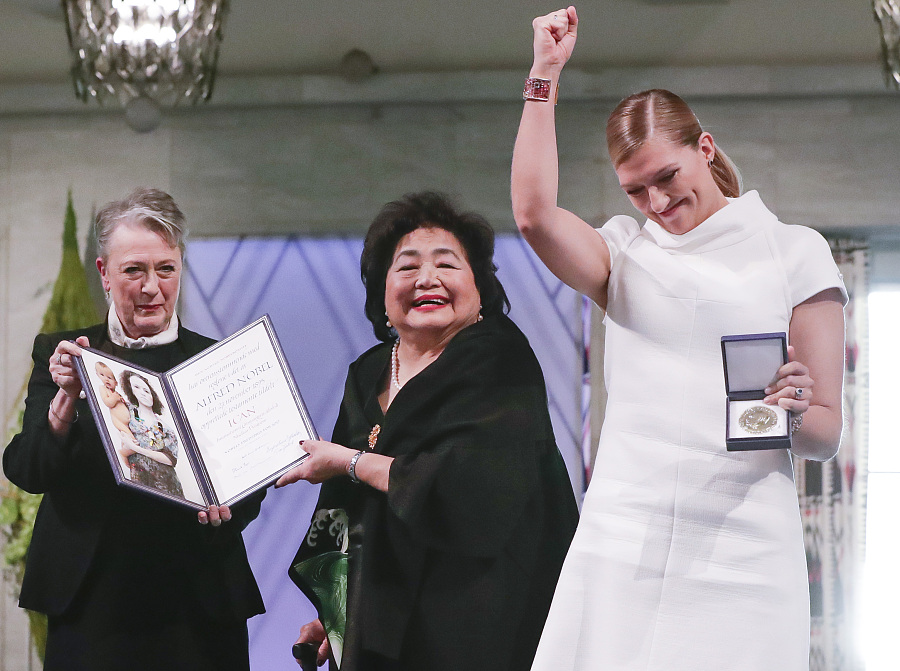With concerted efforts, world can still resolve DPRK issue peacefully
By Zhao Huanxin | China Daily | Updated: 2017-12-14 07:39

The annual Preventive Priorities Survey of New York-based Council on Foreign Relations, released on Monday, has listed a possible armed confrontation between the United States and the Democratic People's Republic of Korea as the "top conflict" to watch in 2018.
In Northeast China's Jilin province that borders the DPRK, the Jilin Daily published a full page of "common sense" advice on Dec 6, counseling readers how to protect themselves from a nuclear explosion, which local authorities later said was routine publicizing of national defense knowledge.
In Oslo, Norway, the International Campaign to Abolish Nuclear Weapons, while receiving the 2017 Nobel Peace Prize at a ceremony on Sunday, warned that humankind's destruction is just one "impulsive tantrum away".
The three events that took place thousands of kilometers apart in less than a week are not the type of happenings that one might use to usher in the New Year.
In the Preventive Priorities Survey, foreign policy experts ranked a military conflict involving the US, the DPRK, and its neighboring countries as No 1 on the top-tier risks. Its impact on US interests was identified as high, meaning it is a contingency directly threatening the US homeland.
The likelihood of the risk is moderate, which means it has "about an even chance of occurring in 2018", according to the survey. Given the warlike threats exchanged between Washington and Pyongyang, the top risk could unfortunately become a reality unless something substantial is done.
Since Dec 4, Seoul and Washington have been engaged in a five-day air force exercise (their largest ever) after Pyongyang tested an intercontinental ballistic missile on Nov 29, which it claimed was capable of striking the US mainland. The DPRK's Korean Central News Agency said the drill pushed the already acute situation to "the brink of nuclear war".
The air force drill was followed by a two-day joint maritime exercise by the US, the Republic of Korea and Japan on Monday to track ballistic missiles, possibly from the DPRK, in the waters near the Korean Peninsula and Japan.
The KCNA, in an editorial on Monday, accused Washington of "spitting out" military threats against the DPRK and pressuring other countries to cut off their diplomatic, economic and trade ties with Pyongyang. It is apparent that the peninsula is caught in a vicious circle of provocation and confrontation.
On Dec 9, United Nations Under secretary-General for Political Affairs Jeffrey Feltman, the first such senior UN envoy to visit Pyongyang since 2010, highlighted the "urgent need to prevent miscalculations and open channels to reduce the risks of conflict", emphasizing that the international community, alarmed by the escalating tensions, is committed to finding a peaceful solution.
This conforms to Beijing's proposal for de-escalation, to at least bring the peninsula situation out of the "black hole" of confrontation, and endeavor to create the right conditions and atmosphere for the resumption of dialogue and negotiation. It also calls for a halt to muscle flexing and stirring up new troubles, and gradually accumulating trust.
It is thus encouraging to note that the DPRK agreed with the UN "to regularize communication through visits at various levels", according to an AFP report. The international community will ultimately realize that China's proposal for a political solution based on a dual-suspension proposal and a dual-track approach, is the only way to ease the tensions on the peninsula.
Dualsuspension means the DPRK suspending its nuclear and missile tests in exchange for the US and the ROK suspending their large-scale military drills, and the dual-track approach means making efforts to simultaneously move forward the process of denuclearization and establishing a peaceful mechanism on the peninsula.
The hope of peace remains alive. The worst-case scenario, which the US Council on Foreign Relations asked policymakers to guard against, has a full year's time in which concerted efforts can be made to prevent it.
The author is deputy editor-in-chief of China Daily USA.huanxinzhao@chinadailyusa.com
























